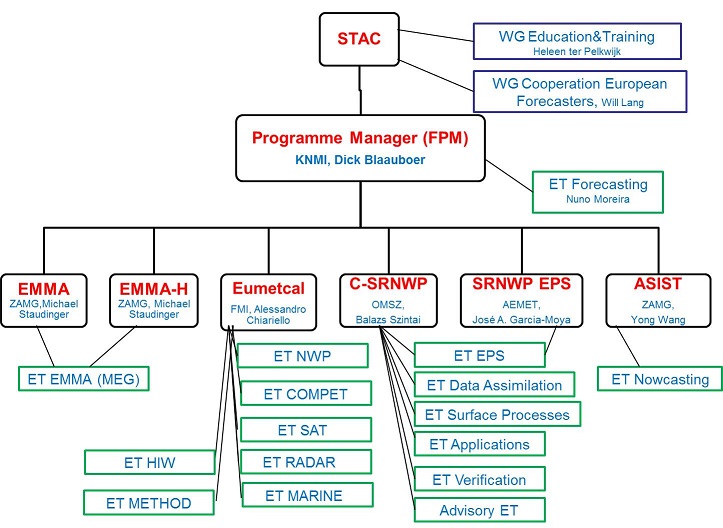FORECASTING CAPABILITY AREA
The EUMETNET Forecasting Capability Area aims at the support of the weather forecasting processes of its members, the national weather offices in Europe. In six separate projects we cooperate to enhance several aspects of the forecasting process: coordination of the numerical weather prediction (NWP) consortia, nowcasting and very short range forecasting in which the forecaster plays a central role, issuing weather and hydrological warnings (www.meteoalarm.eu ), training the forecaster (http://www.eumetcal.org/courses/ ). To optimize the results we are in close contact with the Heads of Forecasting of the national offices and with the Working Group on Cooperation of European Forecasters which is the main forum of operational weather forecasters in Europe.
FORECASTING – SCOPE & PURPOSE

The long term strategic goals of EUMETNET’s Forecasting Programme as derived from EUMETNET’s strategy as valid at the Programme start in 2013 read as follows:
• EUMETNET will support Members in ensuring that they always have highly skilled forecasters through shared training and shared best practice.
• EUMETNET will assist Members and their modelling consortia to develop their forecast models and processes in order to produce the best possible short term forecasts for their clients.
• EUMETNET will have facilitated, through a strategic discussion among Members, the identification and initiation of projects for collaboration, harmonisation and coordination in support of more efficient forecasting systems, and improved regional and short range weather forecasts.
Goal 1 is being achieved by keeping abreast of Member’s training&education (E&T) needs with respect to forecasting tasks and develop the appropriate E&T facilities by further developing the Eumetcal Project and by the exchange of knowledge within and among the various EUMETNET Projects by organizing conferences, workhops and other meetings and by liaising with external Forecasting bodies (ECMWF, WMO, EMS, WGCEF etc.).
Goal 2 is being achieved by supporting the existing Short Range Numerical Weather Prediction Consortia to exchange knowledge and collaborate where possible and efficient within the C-SRNWP Project. Members will benefit through the consortia in which they participate.
Goal 3 is being achieved by initiating new Projects in fields where collaboration is assessed to be efficient and beneficial for Members. On-going Services like MeteoAlarm are being continued in EMMA and extended to hydrology in EMMA-H. New Projects are planned for probabilistic forecasting using EPS in SRNWP EPS and for Nowcasting.

General principles and common goals within the Forecasting Programme have been identified as key priorities:
– building upon past investment;
– nowcasting: organizing activities like Nowcasting Symposium or workshops;
– improved communications with users and understanding of their requirements: a meeting of the Heads of Forecasting of all EUMETNET Members is organized yearly;
– meteorological services supporting protection of life and properties;
– integrated Programme Management;
– sharing of experiences and expertise in SRNWP EPS for improving coordination and assessing integration

Important milestones within the Forecasting Programme included:
– delivery of Feasibility Study and Proposals on SRNWP EPS, June 2014, accomplished
– delivery of Feasibility Study and Proposals on Nowcasting, June 2014, accomplished
– midterm review, mid 2015: only accomplished for the Projects Eumetcal and EMMA

The overall objectives of the Forecasting Programme for the current programme phase (2013-2018) are:
– consistent coordination among all forecasting capability area programmes and with responsible managers of other relevant EUMETNET Programmes (e.g. EUCOS) and liaison with all European NWP consortia
– investigation for updating user requirements on NWP and overviewing nowcasting coordination in respect both to communication with users and as a cross-cutting topic
The objectives for the Projects are summarized under each Project separately.

The current phase of the Programme started in January 2013 and will last, with an extension of one year, until the end of 2018. The Coordinating Member is Royal Netherlands Meteorological Institute and the Programme Manager is Dick Blaauboer.
The organizational overview above presents the Forecasting Programme and its six Projects. The Programme Manager reports to the EUMETNET Scientific and Technical Advisory Committee, STAC. The STAC has two Working Groups in the Forecasting domain:
– Working Group on Education & Training, WGET, Chair Heleen ter Pelkwijk (KNMI):
This Working Group advises STAC on Education&Training issues relevant for the EUMETNET Members including the scope and functioning of Eumetcal, EUMETNET’s own Project for E&T. In this sense it has a function of steering group for Eumetcal. It also advises on the future strategy for E&T.
– Working Group on Cooperation of European Forecasters, WGCEF, Chair Christian Csekits (ZAMG)

This Working Group has been established in 1995 as a Working Group for European forecasters. Since October 2013 it has been agreed that the Working Group would operate as a EUMETNET STAC Working Group by including an advisory role to STAC in forecasting issues next to its original goals as European forecasters group. More information on WGCEF can be found here.
Within the Working Group a Task Team is active working on a procedure to harmonize the naming of storms over Europe. Currently several independent services to name storms are active which is confusing for the public and the media. Storm names turn out to be very important in reporting on storms in the (social) media.
Within the Forecasting Programme several Expert Teams are active. They serve as an expert group advising the Project/Programme Manager. The Expert Team Forecasting advises the FPM. Members are the other Project Managers within the Forecasting Programme plus six Members from the group of Heads of Forecasting. The Chair is Nuno Moreira (IPMA) and the Vice-Chair is Goran Mihajlovic (RHMSS). Other Expert Teams are described on their relevant pages of the website.
In order to tune the programme activities as much as possible to (changing) requirements from the national weather services a yearly meetings with the Heads of Forecasting of the 31 members of EUMETNET are conducted. This is a major opportunity for feedback in both directions.